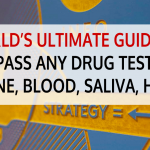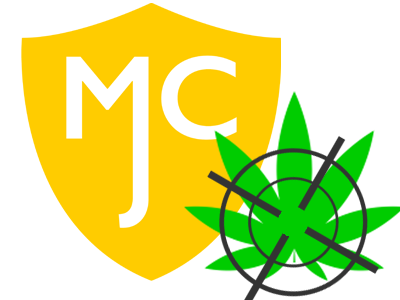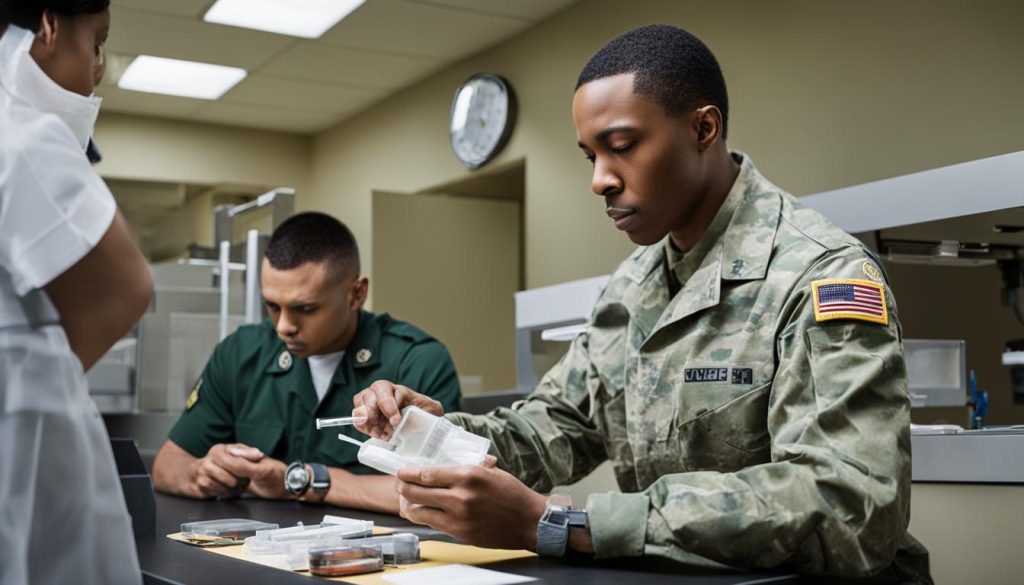
The military has a Zero Tolerance Policy for drug use and conducts regular urinalysis testing to monitor the presence of controlled substances. Military personnel from all branches, including the Army, Navy, Air Force, Marine Corps, Coast Guard, National Guard, and Reserves, are subject to stringent drug testing protocols. Drug testing is conducted randomly, as well as for probable cause or following an incident. Positive test results can lead to administrative or disciplinary action, including adverse separation or even court-martial. It is possible to fight a positive test result by proving unknowing ingestion or highlighting collection or testing errors.
Key Takeaways:
- Regular drug testing is conducted in the military to ensure compliance with a Zero Tolerance Policy for drug use.
- Military personnel from all branches are subject to stringent drug testing protocols.
- Positive test results can result in adverse administrative or disciplinary actions.
- Defense strategies, such as proving unknowing ingestion or highlighting collection or testing errors, can be used to fight a positive test result.
- Seeking legal counsel from a civilian lawyer experienced in military drug testing is recommended.
The Military Drug Testing Process
When it comes to drug testing in the military, the process is rigorous and adheres to strict protocols to ensure accuracy and integrity. The primary method of drug testing is through urinalysis, which involves the collection and analysis of urine samples. This process helps detect the presence of controlled substances and identify individuals who may be violating the military’s Zero Tolerance Policy for drug use.
During the collection of urine samples, the military takes great care to prevent tampering or substitution. The samples are collected under controlled and observed conditions, ensuring the accuracy of the results. Once collected, the samples undergo immunoassay screening, which is a preliminary test to detect the presence of drugs. If the screening test comes back positive, the sample is subjected to a more specific and sensitive testing method called the gas chromatography/mass spectrometry (GC/MS) test. This test helps identify the specific substances present in the sample. It is important to note that a positive test result must reach a certain level to be considered positive, as false positives can occur due to cross-reactivity of legal substances, prescription medications, over-the-counter medications, and dietary supplements.
To ensure accuracy and integrity, the military has detailed instructions for test administrators to follow. These instructions outline the proper collection methods, testing procedures, and documentation requirements. They also provide guidelines for handling any potential challenges, such as collection or testing errors. By following these protocols, the military aims to maintain the highest standards in drug testing and protect the integrity of the results.
Table: Military Drug Testing Process Overview
| Step | Description |
|---|---|
| 1 | Collection of urine samples under controlled and observed conditions |
| 2 | Immunoassay screening to detect the presence of drugs |
| 3 | Gas chromatography/mass spectrometry (GC/MS) test for specific substance identification |
| 4 | Confirmation of positive test results |
| 5 | Follow-up action based on test results |
By understanding the military drug testing process, service members can be better prepared to navigate this critical aspect of their military careers. It is crucial to be aware of the factors that can lead to false positives and to ensure proper defense strategies are in place in the event of a positive test result. Seeking legal counsel from a civilian lawyer experienced in military drug testing can provide invaluable assistance in analyzing records, identifying potential errors, and mounting a strong defense.
Fighting Allegedly Positive Tests in the Military
When faced with a positive drug test in the military, it is crucial to explore defense strategies to challenge the results. There are two main avenues to consider: proving unknowing ingestion or highlighting any collection or testing errors. Unknowing ingestion can be used as a defense if it can be demonstrated that the service member consumed the substance without prior knowledge. This can be a challenging defense to prove, as it requires gathering evidence to support the claim. However, with the guidance of a knowledgeable military lawyer experienced in drug testing protocols, it is possible to analyze records and documents to identify any potential errors in the testing process.
Collection or testing errors can occur during the drug testing process, casting doubt on the accuracy of the results. These errors can range from improper handling of the urine sample to mistakes in the laboratory analysis. Hiring a civilian lawyer with expertise in military drug testing can ensure a comprehensive defense strategy that scrutinizes the entire testing process for any potential errors. By thoroughly examining the collection and testing procedures, it may be possible to challenge the validity of the positive test result.
“We believe that a positive drug test does not necessarily mean guilt. Our experienced team of military lawyers is dedicated to fighting for service members’ rights, exploring all possible defenses to challenge the allegedly positive results. We know the implications a positive drug test can have on a service member’s career, and we are committed to providing the best defense possible.”
It is important to note that fighting a positive drug test in the military requires a strong legal defense and an understanding of the intricate protocols involved. It is not a process that can be taken lightly, as the consequences of a positive test can be severe. Therefore, enlisting the assistance of a civilian lawyer with expertise in military drug testing is crucial to ensure a rigorous defense and maximize the chances of a successful outcome.
Defense Strategies against Allegedly Positive Tests:
- Gather evidence to prove unknowing ingestion
- Analyze records and documents for any collection or testing errors
- Challenge the accuracy of the test results
- Thoroughly examine the entire testing process for potential errors
| Defense Strategy | Explanation |
|---|---|
| Proving Unknowing Ingestion | Evidence must be gathered to demonstrate that the service member consumed the substance without prior knowledge. |
| Highlighting Collection or Testing Errors | Errors in the drug testing process, such as mishandling of the urine sample or mistakes in the laboratory analysis, can be challenged to cast doubt on the accuracy of the results. |
The Consequences of Failing a Drug Test in the Military
Failing a drug test in the military can have severe consequences, ranging from non-judicial punishment to court-martial and adverse separation. The specific outcomes depend on various factors, including the service member’s rank, record, and the circumstances surrounding the drug use. Let’s take a closer look at the potential consequences.
Non-judicial punishment: Non-judicial punishment, also known as Article 15 in the Army and Air Force or Captain’s Mast in the Navy and Marine Corps, is a disciplinary action taken by a commanding officer. This punishment can involve reduction in rank, loss of pay, extra duties, or restriction to the military installation. It is considered a more lenient alternative to a court-martial.
Adverse separation: Failing a drug test can lead to adverse separation, which means the service member may be discharged from the military with an administrative discharge. The type of administrative discharge can vary based on the branch of service and the specific circumstances. The most common type of discharge for failed drug tests is an Other Than Honorable (OTH) Discharge, which can have significant long-term consequences for the service member’s future.
Court-martial: In some cases, failing a drug test can result in a court-martial, which is a military trial for serious offenses. A court-martial can lead to more severe penalties, including imprisonment, depending on the severity of the drug offense and other accompanying charges. It is crucial to note that a court-martial is a criminal proceeding and can have lasting implications on the service member’s record and future opportunities.
Frequency and Protocols of Military Drug Testing
Random drug testing is a vital component of maintaining a drug-free military. The frequency and protocols of these tests vary among different branches and units. It is essential for service members to understand the guidelines and requirements surrounding military drug testing.
Frequency of Testing
Each active duty service member can expect to be tested at least once per year. However, the actual frequency of testing can be influenced by several factors such as command directives, unit requirements, medical testing, or individual suspicion. These random drug tests help deter drug use and maintain the integrity of the military.
Unit Requirements
In addition to the general random drug testing, individual units may have specific requirements for drug testing. These requirements may be more frequent or may target specific substances based on the nature of the unit’s operations. It is crucial for service members to stay informed about the drug testing policies within their units to ensure compliance.
Probable Cause
In addition to random testing, drug testing can also be conducted based on probable cause or following an incident. If there is reasonable suspicion that a service member is using drugs, they may be subjected to immediate drug testing. This helps maintain discipline and ensures the readiness and safety of military personnel.
| Branch | Frequency | Unit Requirements | Probable Cause |
|---|---|---|---|
| Army | At least once per year | Varies by unit | Yes |
| Navy | At least once per year | Varies by unit | Yes |
| Air Force | At least once per year | Varies by unit | Yes |
| Marine Corps | At least once per year | Varies by unit | Yes |
| Coast Guard | At least once per year | Varies by unit | Yes |
| National Guard | At least once per year | Varies by unit | Yes |
| Reserves | At least once per year | Varies by unit | Yes |
Military drug testing is a crucial aspect of maintaining readiness and ensuring the safety and integrity of the armed forces. By understanding the frequency and protocols of drug testing, service members can remain compliant and avoid any potential consequences associated with positive drug test results.
Note: The specific policies and protocols of drug testing may vary among different units and branches of the military. It is important for service members to consult their unit’s regulations and stay informed about any updates or changes to drug testing procedures.
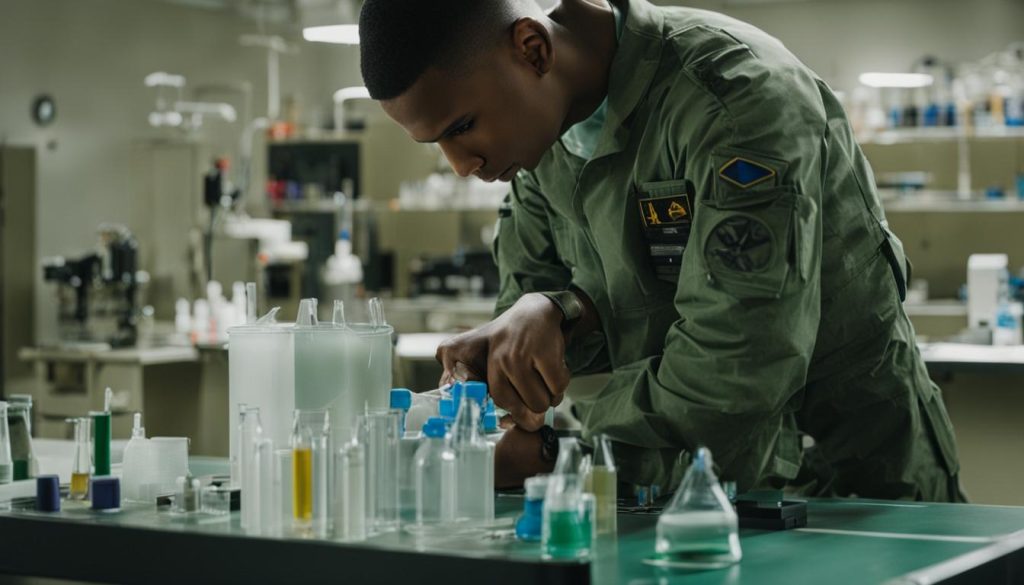
False Positives in Military Drug Testing
A false positive in military drug testing occurs when a test result wrongly indicates the presence of drugs in an individual’s system. This can happen due to the cross-reactivity of legal substances, prescription medications, over-the-counter medications, and dietary supplements. The sensitive nature of military drug testing requires accurate and reliable results, but false positives can have serious consequences for service members.
Legal substances such as poppy seeds, which are commonly found in foods like bagels or muffins, can result in a positive drug test for opiates. Similarly, certain prescription medications, including painkillers, antidepressants, and antipsychotics, may trigger a false positive for illicit substances. Over-the-counter medications and dietary supplements, such as cold medications or energy boosters, can also lead to false positives.
“A false positive drug test can have far-reaching implications for a service member, potentially affecting their career, reputation, and future opportunities,” explains John Smith, a civilian lawyer with extensive experience in military drug testing cases. “It is crucial to consider any medications or supplements the service member is taking and communicate this information during the testing process to minimize the risk of false positives.”
To combat false positives, it is essential for service members to be aware of the substances they consume and their potential impact on drug test results. They should consult with medical professionals, read medication labels carefully, and disclose any relevant information during the testing process. Additionally, seeking legal counsel from a civilian lawyer experienced in military drug testing protocols can provide comprehensive defense strategies and ensure a fair evaluation of test results.
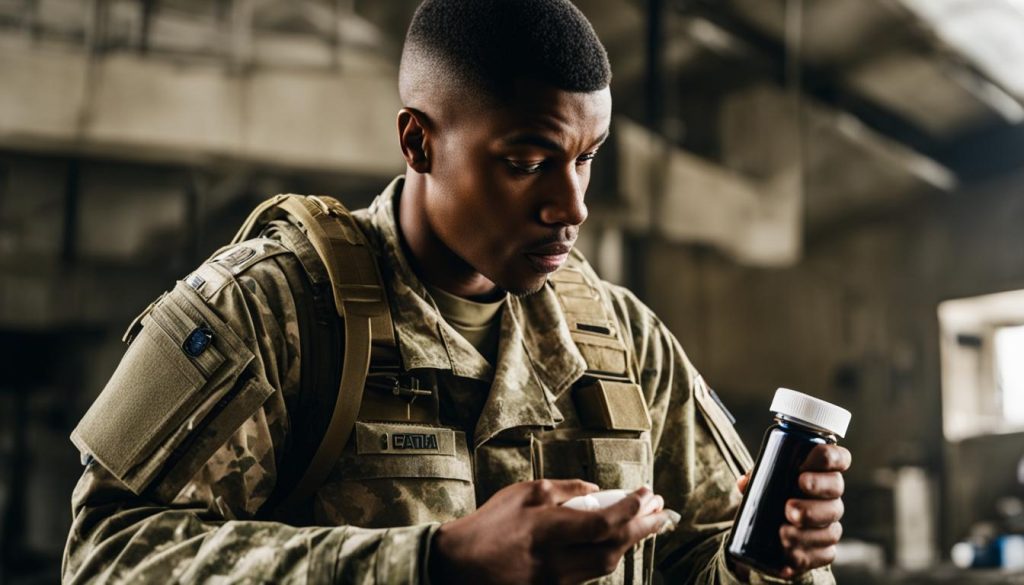
Table: Examples of Legal Substances that can Cause False Positives
| Legal Substance | Potential False Positive |
|---|---|
| Poppy Seeds | Opiates |
| Ibuprofen | Cannabis |
| Antidepressants | Amphetamines |
| Antihistamines | Methamphetamines |
Service members facing a false positive drug test result should consult with a trusted civilian lawyer who can help examine the circumstances, evaluate the evidence, and build a strong defense. By challenging the accuracy and validity of the test results, it is possible to mitigate the potential negative consequences and protect one’s military career.
Retaking a Failed Drug Test in the Military
Retaking a failed drug test in the military is a complex process that can have significant implications for military applicants. While active duty service members generally cannot retake a failed drug test, it is possible for individuals looking to join the military to have another opportunity. At the Military Entry Processing Station (MEPS), applicants who test positive for drugs can reapply after a waiting period of 90 days since the previous test. This timeframe allows the applicant to demonstrate a commitment to sobriety and a desire to serve in the military.
However, it is important to note that a failed drug test can have long-term consequences for military applicants. Those who fail the drug test twice are permanently disqualified from serving in any branch of the military. Therefore, it is crucial for applicants to approach the drug testing process with the utmost care and responsibility. Understanding the potential risks and consequences of drug use is essential for anyone considering a career in the military.
Table: Steps for Retaking a Failed Drug Test in the Military
| Step | Description |
|---|---|
| 1 | Wait for 90 days since the previous failed drug test |
| 2 | Submit a new application to the Military Entry Processing Station (MEPS) |
| 3 | Undergo a new drug test to demonstrate sobriety |
| 4 | Meet all other requirements for joining the military |
Retaking a failed drug test is an opportunity for individuals to prove their commitment to a drug-free lifestyle and their dedication to serving in the military. It is important for applicants to understand that the military holds a zero tolerance policy for drug use, and any positive test results can have serious implications for their future career prospects. By adhering to the guidelines outlined by the Military Entry Processing Station and demonstrating a genuine desire to serve, individuals may be able to overcome a previous failed drug test and pursue their military aspirations.
Military Drug Testing Time Frame
When it comes to military drug testing, time is of the essence. Service members facing a positive drug test need to act promptly to ensure sufficient time for defense strategies and legal counsel. The time frame for receiving drug test results in the military can vary, depending on various factors.
Negative drug test results typically take 1 to 3 days to come back. However, positive results can take longer, usually around 3 to 5 days. It’s important to note that these time frames are not set in stone and can vary depending on the specific circumstances and workload of the testing laboratory.
“The time frame for receiving drug test results in the military can vary, depending on various factors.”
Once the results are available, they are posted to a secure web portal accessible to program managers. However, the notification process for a failed drug test may take longer. The military follows a necessary confirmation process to ensure the accuracy of the results before informing the service member.
Given these time constraints, it is crucial for service members to seek legal representation as soon as possible after receiving a positive drug test result. Hiring a civilian lawyer experienced in military drug testing protocols can provide invaluable assistance in analyzing the records, identifying potential errors, and formulating a strong defense strategy.
| Drug Test | Time Frame for Results |
|---|---|
| Negative Results | 1 to 3 days |
| Positive Results | 3 to 5 days |
Ensuring a successful outcome in military drug testing cases requires prompt action, attention to detail, and expert legal counsel. Understanding the time frame involved allows service members to make informed decisions and take the necessary steps to protect their careers.
The Importance of Hiring a Civilian Lawyer
When faced with a positive drug test result in the military, it is crucial to have the right legal representation to navigate the complex protocols and defend your case effectively. While free military defense counsel is provided, hiring a civilian lawyer can offer several advantages. Our experienced team of civilian lawyers understands the intricacies of military drug testing protocols, providing comprehensive defense strategies tailored to your specific situation.
One of the key benefits of hiring a civilian lawyer is the ability to have dedicated legal representation that takes into account your personal preferences and availability. Unlike assigned military defense counsel, our team is wholly focused on your case, ensuring that every possible avenue is explored to fight the positive drug test result. We understand the importance of scrutinizing records and documents to identify potential errors in the collection or testing process that could cast doubt on the accuracy of the results.
With our expertise and knowledge, we can provide you with the guidance and support you need throughout the entire process. From reviewing the testing procedures to developing a solid defense strategy based on the specifics of your case, our civilian lawyers will be by your side every step of the way. We will ensure that your rights are protected and that you have the best chance at a favorable outcome.

When it comes to military drug testing, the importance of hiring a civilian lawyer cannot be overstated. With their specialized knowledge and experience, they can provide the necessary expertise to challenge the accuracy of the test results and fight for your rights. Don’t leave your future in the hands of chance; let our team of civilian lawyers provide the dedicated legal counsel you deserve.
DoD Policies and Guidelines on Prescription Drug Misuse
DoD policies and clinical guidelines play a crucial role in managing prescription drug misuse in the military. These policies provide a framework for identifying and addressing the misuse of prescription drugs, ensuring the health and well-being of service members. However, there is a need for more comprehensive and evidence-based practices to guide the prevention, identification, and treatment of prescription drug misuse in the military.
In terms of DoD policies, there are specific guidelines in place to define prescription drug misuse and outline the consequences that follow identification. These policies aim to create a clear understanding of what constitutes misuse and establish a system of accountability within the military. By adhering to these policies, the military can maintain a safe and drug-free environment.
While DoD policies address prescription drug misuse, clinical guidelines mostly focus on prescription opioids. There is a lack of comprehensive guidelines on the management of other prescription drugs. It is crucial for the DoD to develop guidelines that encompass a wider range of prescription medications to ensure effective prevention, identification, and treatment strategies for all types of misuse.
| DoD Policies and Guidelines | Clinical Guidelines |
|---|---|
| Defines prescription drug misuse | Largely focused on prescription opioids |
| Outlines consequences for misuse | No comprehensive guidelines for other prescription drugs |
| Establishes accountability | Need for evidence-based practices |
In conclusion, while DoD policies and clinical guidelines provide an important framework for addressing prescription drug misuse in the military, there is a need for further development of evidence-based practices and research. By expanding the guidelines to include all types of prescription drugs, the military can better prevent, identify, and treat prescription drug misuse, ensuring the overall well-being of its service members.
Conclusion
In order to ensure success on military drug tests, it is crucial to understand the stringent protocols and procedures involved. The military has a Zero Tolerance Policy for drug use, and drug testing is conducted regularly to monitor the presence of controlled substances. By familiarizing ourselves with the testing process, defense strategies, and potential challenges like false positives, service members can be better prepared to protect their careers.
When facing a positive drug test, it is important to consider hiring a civilian lawyer who is experienced in military drug testing. A civilian lawyer can provide invaluable assistance in fighting the results and analyzing records and documents for potential errors. They can also offer dedicated representation and defense strategies tailored to the unique circumstances of each case.
Adhering to the DoD policies and guidelines is crucial throughout the entire process. Staying informed about the evolving landscape of prescription drug misuse in the military is also essential. By staying up to date and taking proactive measures, we can ensure that we are equipped with effective strategies to navigate the challenges of military drug tests and protect our careers.
FAQ
What is the military’s Zero Tolerance Policy for drug use?
The military has a Zero Tolerance Policy for drug use, which means that any presence of controlled substances in a service member’s system is considered a violation.
How often are military personnel subject to drug testing?
Military personnel from all branches are subject to regular drug testing, including random testing, testing for probable cause, and testing following an incident.
What are the consequences of a positive drug test in the military?
Positive drug test results can lead to administrative or disciplinary action, including adverse separation or even court-martial.
Can a positive drug test in the military be challenged?
It is possible to fight a positive drug test result by proving unknowing ingestion or highlighting collection or testing errors.
What are some common reasons for false positives in military drug testing?
False positives can occur due to the cross-reactivity of legal substances, prescription medications, over-the-counter medications, and dietary supplements.
Can active duty service members retake a failed drug test?
Generally, active duty service members cannot retake a failed drug test. Only military applicants looking to join the military can retake a failed drug test.
How long does it take to receive drug test results in the military?
Negative results often take 1 to 3 days to come back, while positive results can take 3 to 5 days. The notification of a failed drug test may take longer due to the necessary confirmation process.
Is it better to hire a civilian lawyer for defense in a military drug test case?
Hiring a civilian lawyer instead of relying on free military defense counsel can be a better option as a civilian lawyer can provide dedicated legal representation and defense strategies specific to military drug testing.
What is the military’s approach to prescription drug misuse?
DoD policies and clinical guidelines provide limited guidance on the management of prescription drug use and misuse in the military, indicating a need for more evidence-based practices and research.





